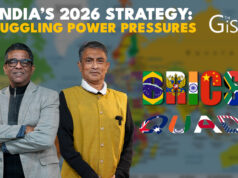In this exclusive interview, Professor Rajan Kumar, a Eurasia expert at Jawaharlal Nehru University (JNU), delves into the strategic importance of Mongolia amid Vladimir Putin‘s recent visit. Despite its relatively small population and geographic isolation, Mongolia plays a crucial role in the geopolitics of the Eurasian region, sandwiched between two giants—Russia and China. Historically aligned with the Soviet Union during the Cold War, Mongolia has since adopted a multipolar strategy, seeking to balance relations with China, Russia, and other global powers like India, Japan, and the United States.
Professor Kumar explains Mongolia’s “third neighbour” policy, which seeks to diversify its international partnerships beyond its immediate neighbors. He discusses the significance of Mongolia’s rare earth metals, crucial to regional powers like India, China, and Russia, and the economic opportunities they present. India, having cultural and economic ties with Mongolia, is an important player in this balancing act, especially with the recent investments in sectors like energy and mining.
The conversation also covers the geopolitical ramifications of Russia’s “Power of Siberia 2” pipeline, which seeks to further cement Russian energy ties with China, and how Mongolia is navigating its place in this growing Russia-China partnership. Finally, Professor Kumar addresses how Mongolia’s efforts to maintain neutrality will be tested as Western nations react to Putin’s visit amidst the ongoing Ukraine conflict and the International Criminal Court’s ruling.
Tune in for Professor Kumar’s nuanced take on Mongolia’s delicate geopolitical balancing act. Don’t forget to like and share this video. Subscribe to StratNewsGlobal and watch Global Compass every week to stay informed of all that is happening in the global scenario.
Neelanjana Banerjee is a Broadcast Media Specialist with 23 years of cross-media experience in designing and producing content for television, radio and online media.
Having held a wide range of roles in various aspects of electronic media, she is a multifaceted professional and has an in-depth and hands on experience in broadcast
content, programming, media production, channel / product launch, TV and
radio skills training and online content.
Neelanjana was awarded the Chevening Gurukul fellowship in Leadership & Excellence from King's College, London in 2016.




